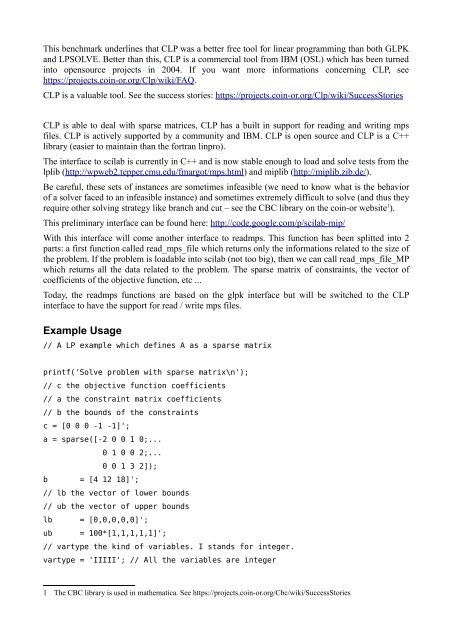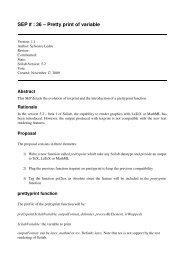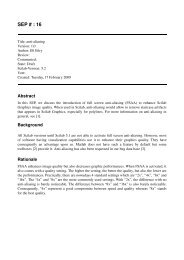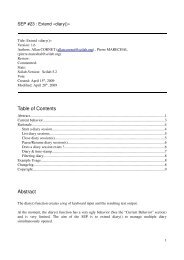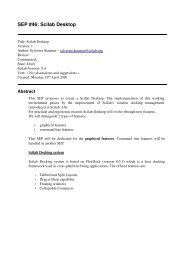SEP # : - Scilab
SEP # : - Scilab
SEP # : - Scilab
You also want an ePaper? Increase the reach of your titles
YUMPU automatically turns print PDFs into web optimized ePapers that Google loves.
This benchmark underlines that CLP was a better free tool for linear programming than both GLPK<br />
and LPSOLVE. Better than this, CLP is a commercial tool from IBM (OSL) which has been turned<br />
into opensource projects in 2004. If you want more informations concerning CLP, see<br />
https://projects.coin-or.org/Clp/wiki/FAQ.<br />
CLP is a valuable tool. See the success stories: https://projects.coin-or.org/Clp/wiki/SuccessStories<br />
CLP is able to deal with sparse matrices, CLP has a built in support for reading and writing mps<br />
files. CLP is actively supported by a community and IBM. CLP is open source and CLP is a C++<br />
library (easier to maintain than the fortran linpro).<br />
The interface to scilab is currently in C++ and is now stable enough to load and solve tests from the<br />
lplib (http://wpweb2.tepper.cmu.edu/fmargot/mps.html) and miplib (http://miplib.zib.de/).<br />
Be careful, these sets of instances are sometimes infeasible (we need to know what is the behavior<br />
of a solver faced to an infeasible instance) and sometimes extremely difficult to solve (and thus they<br />
require other solving strategy like branch and cut – see the CBC library on the coin-or website 1 ).<br />
This preliminary interface can be found here: http://code.google.com/p/scilab-mip/<br />
With this interface will come another interface to readmps. This function has been splitted into 2<br />
parts: a first function called read_mps_file which returns only the informations related to the size of<br />
the problem. If the problem is loadable into scilab (not too big), then we can call read_mps_file_MP<br />
which returns all the data related to the problem. The sparse matrix of constraints, the vector of<br />
coefficients of the objective function, etc ...<br />
Today, the readmps functions are based on the glpk interface but will be switched to the CLP<br />
interface to have the support for read / write mps files.<br />
Example Usage<br />
// A LP example which defines A as a sparse matrix<br />
printf('Solve problem with sparse matrix\n');<br />
// c the objective function coefficients<br />
// a the constraint matrix coefficients<br />
// b the bounds of the constraints<br />
c = [0 0 0 -1 -1]';<br />
a = sparse([-2 0 0 1 0;...<br />
0 1 0 0 2;...<br />
0 0 1 3 2]);<br />
b = [4 12 18]';<br />
// lb the vector of lower bounds<br />
// ub the vector of upper bounds<br />
lb = [0,0,0,0,0]';<br />
ub = 100*[1,1,1,1,1]';<br />
// vartype the kind of variables. I stands for integer.<br />
vartype = 'IIIII'; // All the variables are integer<br />
1 The CBC library is used in mathematica. See https://projects.coin-or.org/Cbc/wiki/SuccessStories


